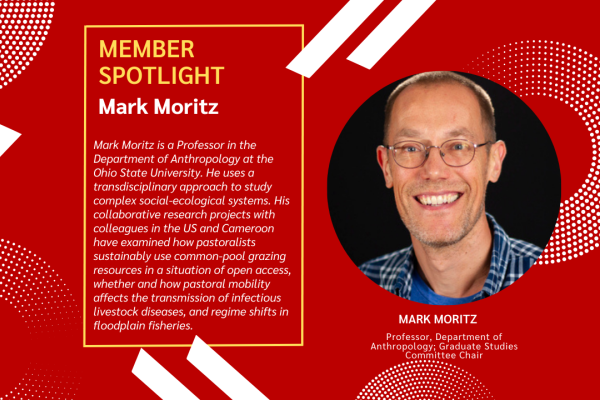STEAM Member Spotlight: Mark Moritz

Mark Moritz is a Professor in the Department of Anthropology at the Ohio State University. He uses a transdisciplinary approach to study complex social-ecological systems. His collaborative research projects with colleagues in the US and Cameroon have examined how pastoralists sustainably use common-pool grazing resources in a situation of open access, whether and how pastoral mobility affects the transmission of infectious livestock diseases, and regime shifts in floodplain fisheries. He is also responsible for helping launch the Wicked Science GIS program, which encourages interdisciplinary approaches to solving some of the world's biggest issues, like climate change. Interdisciplinary Team Science, a course that will be offered as part of the Wicked Science program this fall, aims to teach the necessary skills to lead or participate in collaborative, scientific teams.
We asked Mark a few questions about his role at Ohio State, as well as his thoughts on the STEAM Factory!
- Tell me about yourself and your role at Ohio State (Department, title, why you got involved).
-
I am professor in the Department of Anthropology, where I have been teaching since forever. Most of my research and other activities have been interdisciplinary with colleagues across Ohio State. I got involved with the STEAM Factory to find more creative co-conspirators who think outside the box.
-
- Tell me about your research. What do you find interesting about this subject matter?
- My research focuses on complex social-ecological systems, in particular pastoral systems in which keeping herd animals is a way of making a living and a way of life. Most of my research has been interdisciplinary with colleagues at Ohio State and Maroua University in Cameroon, where I have conducted most of my research. What interests me about pastoral systems is the interdependencies between people, herd animals, and rangelands – it still amazes me how people make a living in what we would consider marginal environments like the deserts, mountains, and tundras of the world. More information about my research can be found on my website: https://mlab.osu.edu
- You’ve recently helped co-create the Wicked Science Graduate Interdisciplinary Specialization. Can you give a brief overview of what this program is and shout out other collaborators who helped you create this program?
-
The wicked science program is intended for graduate students from across the university, from anthropology to veterinary medicine. I am now often saying that wicked science is neither wicked, nor just science. In other words, it is not evil, and it is not just for scientists; it is also intended for students from the arts and humanities.
We developed the program from the ground up, starting with Rittel and Webber’s concept of wicked problems, and then using that to identify the competencies of wicked scientists. Take, for example, the first three characteristics of wicked problems: they are complex without clear boundaries, there are no permanent solutions, and there are only better or worse solutions (or good-enough-for-now solutions). These characteristics demand that wicked scientists use a systems-thinking approach, be prepared for long-term engagement with wicked problems, and cultivate an attitude that good-enough-for-now solutions are worthy objectives. Using a backward design approach we derived our learning goals, outcomes, and proficiencies.
The program consists of four interdisciplinary courses: wicked science, interdisciplinary team science, an elective design / hacking course, and a capstone workshop: careers for wicked scientists. More information about the program can be found here: https://u.osu.edu/wicked/home/
It took us many years to put this program together. The list of people that helped us develop this project is quite long, but the current team consists of Nick Kawa, Alison Bennett, Rachel Kajfez, Elizabeth Newton, Charlene Brenner, Yolanda Zepeda, Teresa Johnson, David Sovic, Ethan Rivera, Elizabeth Sanders, and graduate students David Hibler and Lauren Chivington. And then there are others who serve on the program and institutional advisory boards. It is large and good group of people. Wicked science is serious business, but we do not take ourselves that seriously.
-
- Interdisciplinary collaboration is a core pillar of the Wicked Science program. Why do you think interdisciplinary collaboration is so important to modern problem-solving?
-
While the university may be organized in departments representing different disciplines, that is not the case for wicked problems. To tackle wicked problems, transdisciplinary collaboration is necessary. Of course, that means that students in the wicked science program should develop these collaborative skills, often called “soft skills”, which is a misnomer because these skills are critical for successful teams. Another way to frame it is to say that all wicked problems are human problems (i.e., problems involving humans) and that therefore people-skills are invaluable.
-
- What is your favorite STEAM event? Or what is your favorite aspect of the STEAM community?
-
I have not been a STEAM member long and have not participated in many events, but the STEAM exchange has been one of my favorite events because of the intellectual engagement across disciplines.
-
- What are your interests/hobbies outside of campus?
- My hobbies are gardening, raising chickens, running, yoga, cycling, graphic novels, and I love listening to jazz and other music. I have also become a “local politician” and serve on the Clintonville Area Commission.
